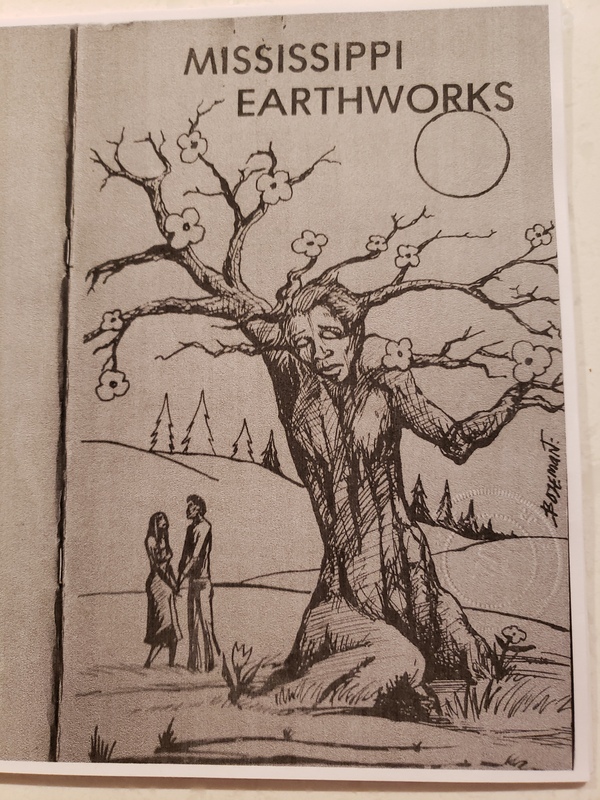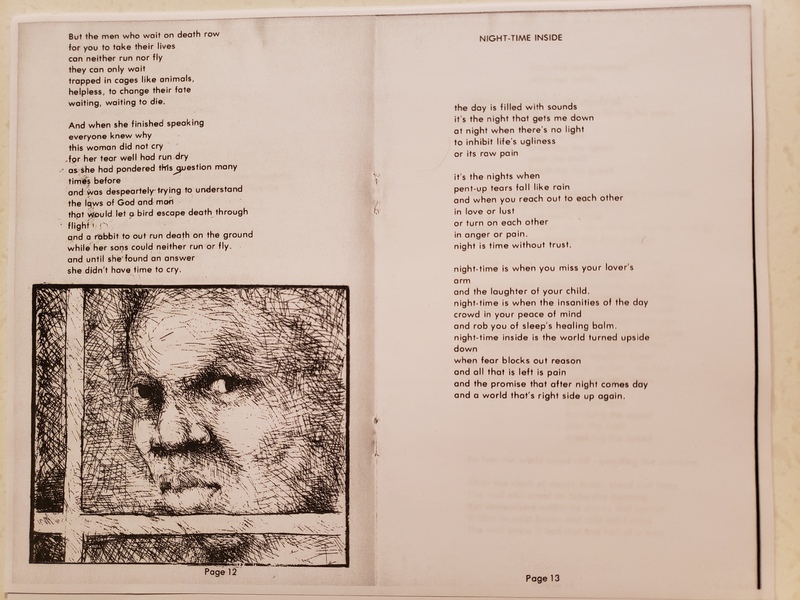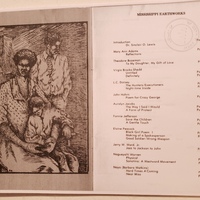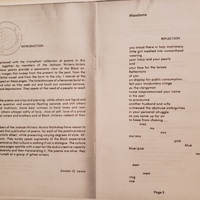-
Title
-
Mississippi Earthworks
-
This edition
-
"Mississippi Earthworks." Ed. Jackson Actors/Writers Workshop. Jackson, Mississippi: Earthworks Publications, 1982. 32 pp.
-
Table of contents
-
● Dr Sinclair O. Lewis / Introduction
● Mary Ann Adams / Reflections
● Theodore Bozeman / To My Daughter, My Gift of Love
● Virgia Brocks-Shedd / Untitled
● Virgia Brocks-Shedd / Definitely
● L. C. Dorsey / The Hunters/Executioners
● L. C. Dorsey / Night-time Inside
● John Hohrn [sic, Horhn?] / Poem for Crazy George
● Aurolyn Jacobs / The Way I Said I Would
● Aurolyn Jacobs / A Form of Protest
● Fannie Jefferson / Save the Children
● Fannie Jefferson / A Gentle Touch
● Elaine Peacock / Black Girl Poem 1
● Elaine Peacock / Making of a Spokesperson Good Soldier/Wrong Weapon
● Jerry W. Ward, Jr. / Jazz to Jackson to John
● Nagueyalti Warren / Physical
● Nagueyalti Warren / Sonatina: A Westward Movement
● Naya (Barbara Watkins) / Hard Times A’Coming
● Naya (Barbara Watkins) / Near Miss
-
About the anthology
-
● This chapbook poetry anthology, a product of the Jackson Actors/Writers Workshop, includes, in addition to the introduction, 18 poems by 11 authors and illustrations by Theodore Bozeman.
● There are some small variations in the text itself compared to the table of contents: Mary Ann Adams’ name is printed as “Maadams” at the head of her poem (3); L. C. Dorsey’s name is missing at the head of her two poems (11); John Horhn’s name is missing at the head of his poem (14); “A Gentle Touch” is in quotation marks at the head of the poem (i.e., presented as quoted discourse) (19); at the head of the poem the title of Elaine Peacock's second poem ends with a question mark: “Making of a Spokesperson Good Soldier/Wrong Weapon?” (21); Jerry W. Ward, Jr.’s poem carries the dedication “(for John Reese)” (23); at the head of her poems, the name “barbara watkins” is written without capitals (28).
-
Anthology editor(s)' discourse
-
● The introduction by Dr. Sinclair O. Lewis speaks of “the Black experience” and of “our common sorrows, fears, hopes and depressions,” but it also emphasizes the diversity of circumstances reflected in the poems, “from the present to the past, from the sweet to the bitter-sweet and from the farm to the city” (2). It emphasizes the longing for community borne out of these commonalities and these diversities: the poems, Lewis writes, “speak of the need of a people to reach one another” (2).
● Lewis also emphasizes the transformative capacity of creative expression: these poems and their authors exhibit “a creative capacity for meeting adversity and then transcending it” (2).
-
Reviews and notices of anthology
-
● Dent, Thomas C. "Mississippi Earthworks: A Collection of Poems." "Jackson Advocate" (2-8 Sept. 1982): sec. A, page 3.
-
"The publication this summer of 'Mississippi Earthworks,' a collection of poems by eleven writers from the Jackson Actors/Writers Workshop, is a signal achievement of which the Black community in Mississippi can be justly proud. At a time when Black literary voices are becoming scarce, it is of great benefit when our writers work together in forging their individual visions within a framework of strong cultural community. We are individuals, but we have to learn to work together and depend on each other for mutual support."
● Dent commends all the poems in the volume, but he cites "especially" five or six poems: "Reflections" by Mary Ann Adams ("it grows out of the experiences of a Black girl in Mississippi" and "bridges personal and communal impressions"); "Night-time Inside" by L. C. Dorsey ("an honest and moving sketch from a writer who has become well-known for her strong political and socially-conscious prose"); "Making of a Spokesperson" by Elaine Peacock (the poem embodies a "process of intelligent questioning . . . to examine the societal roles we are forced into, or assume"); "Jazz to Jackson to John," a tribute to John Reese by Jerry Ward ("Ward's poem is functional poetry in the best Black literary sense: making the poem work to honor those in our culture, in our communities who have used their lives in a historically valuable way, . . . reminding us: 'never say goodbye to the blues that saw you through nor put down the spirituals and salty sermonettes the drugs, the junkies, the jukebox juice, the sweat and the pain . . .'"); "Pain" by Nagueyati Warren (which also operates "in this vein"); and "Hard Times A' Coming" by Barbara Watkins ("she is one of the most eloquent, but unfortunately not well-enough known, Black women poets"). Dent ends his review with a quotation from Watkins' poem that echoes his own earlier statement about needing "to work together and depend on each other for mutual support":
"yes, I see hard times
a' coming
and I see blk folk
rediscovering
we are still
our own best resources
and I rejoice."
"The vision, execution and achievement of this small, handsome volume is one important way of bringing that sense of hope to fruition. Those of us who know the meaning of this work should all rejoice."
-
● A typescript carbon and article photocopy of this review are available in the Tom Dent Papers, 1861-1998, Amistad Research Center, Tulane University. The only substantive difference between the typescript and the printed review is that in the typescript "black" is not capitalized, whereas in the published review it is ("Black"). “The Jackson Advocate served as the major Black newspaper outlet for Black poets in Mississippi during the 1980s” (Julius E. Thompson. "Black Life in Mississippi: Essays on Political, Social and Cultural Studies in a Deep South State." Lanham, MD: UP of America, 2001. 120n.44) Some of Tom Dent's writings are collected in "New Orleans Griot: The Tom Dent Reader," ed. Kalamu ya Salam (New Orleans: U of New Orleans P, 2018).
-
Commentary on anthology
-
● The anthology appears in the catalog of the library of Dr. Boubacar Barry (item 84 of 1109). Barry taught at the University of Dakar: “Barry accumulated a fine library that he made available to students and colleagues” (Martin Klein. “Boubakar Barry, Historian of Senegambia, Selected as 2016 Honorary Foreign Member [of the American Historical Association].” "Perspectives on History" 1 Nov. 2016. Web.)
-
See also
-
● Thompson, Julius E. “The Black Poet in Mississippi, 1900-1980.” "Africana Studies: A Disciplinary Quest for Both Theory and Method." Ed. James L. Conyers, Jr. Jefferson, NC: McFarland, 1997. 208-28.
● Thompson, Julius Eric. "Black Life in Mississippi: Essays on Political, Social and Cultural Studies in a Deep South State." Lanham, MD: UP of America, 2001.
-
Item Number
-
A0531
-
Acknowledgments
-
● My thanks to Jerry W. Ward, Jr. for supplying me with a copy of this anthology.







